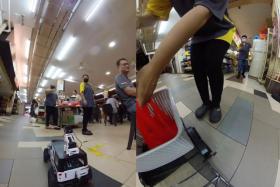Learn tech and adapt in digital era
There's still a role for man in a future with machines, but he must learn to work with them
There is plenty of talk about the potential mass displacement of jobs to automation and technology in the digital future.
Clearly, the world is experiencing unprecedented change which is touching every aspect of industry - from how products are made, to how people are managed and how business is conducted.
Breakthroughs in artificial intelligence (AI), automation, robotics, autonomous vehicles and the Internet of Things (IoT) are causing disruption at an unprecedented intensity, transforming the way we live, work and interact.
A McKinsey Global Institute report indicates that less than 5 per cent of occupations can be completely automated using current technologies.
However, almost every occupation has the potential for partial automation, including middle-skill and high-skill jobs.
Some jobs in finance, law and healthcare are also not immune.
It is against this backdrop of rapid technological progression and shifts in geopolitical, socio-economic and demographic factors, that the Committee on the Future Economy has proposed its economic strategies for the next decade.
In the digital future where new jobs are likely to emerge as fast as others get displaced, some industries are more vulnerable to disruption, with some going as far as to say that the end is near for blue-collar workers.
Given that the most in-demand skills today did not exist like even 10 years ago, what can we do to stay competitive and relevant in the digital future?
History has shown that with technological advances come fresh opportunities.
According to the World Economic Forum's Future of Jobs report, technological advances and other socio-economic factors will create 2.1 million new jobs by 2020.
Technology such as AI, robotics, IoT, cloud computing, big data analytics and seamless collaboration is driving companies to reimagine their businesses for the digital age.
Coupled with the pressures of changing trends in consumer expectations such as instant gratification, mass customisation and miniaturisation, businesses must adapt or risk obsolescence in the digital future.
As firms undergo revamps to transform into enterprises of the future, new ecosystems and new jobs will emerge, and the skills that employers need from workers will change.
New jobs requiring different skills will emerge, and workers will perform work that complements machines, and vice versa.
Take manufacturing jobs for instance. With the industry becoming more high-tech, workers with advanced skill sets in robotics, automation and data science are needed to manage complex systems and data on the production floor.
As automation and machines become more pervasive, there will be increased collaboration between people and machines on complex tasks.
New jobs requiring different skills will emerge, and workers will perform work that complements machines, and vice versa.
As jobs evolve into on-demand and project-based activities, the traditional concept of a job will be eroded.
To compete in the knowledge-based economy of the future, the modern workplace will need workers who can find unprecedented ways of combining machine learning, business and technology skills to achieve higher productivity.
FACTORIES OF THE FUTURE
Leading manufacturers are recognising the need to incorporate increasing levels of digital manufacturing into their factories due to changing consumer trends, shrinking product life cycles and technological innovations.
By integrating an automated factory, labour costs and labour scarcity can be optimised while consistency, quality and flexibility can be enhanced.
However, even as manufacturing incorporates more automation, people and intellect remain key parts of manufacturing.
Machines are learning to accomplish human processes while human capabilities and skills are being harnessed at a higher value, leading to better outcomes, new opportunities and continuous innovation.
In the Factory of the Future, people and machines will work collaboratively to optimise manufacturing processes and output, to deliver outcomes that neither can produce alone.
At the end, people will be vital to the productivity, efficiency and success of all digitised operations in the future.
Employers will need to support and train their employees to thrive in a data-centric environment where human-machine collaboration is critical in daily operations.
Leading companies will be those that reimagine their workforces by tapping the unprecedented power of people and machines working together in ways we've never imagined.
In the future workplace where people move fluidly among different roles and projects, social and emotional intelligence, cognitive abilities and critical-thinking skills will be enormously beneficial, besides advanced technical skills.
Embracing new technologies, building new capabilities through continual retraining, and having an adaptive mindset will be critical factors to succeed in the digital economy.
The writer is general manager at Jabil Singapore. This article was published in The Business Times yesterday.
Get The New Paper on your phone with the free TNP app. Download from the Apple App Store or Google Play Store now


